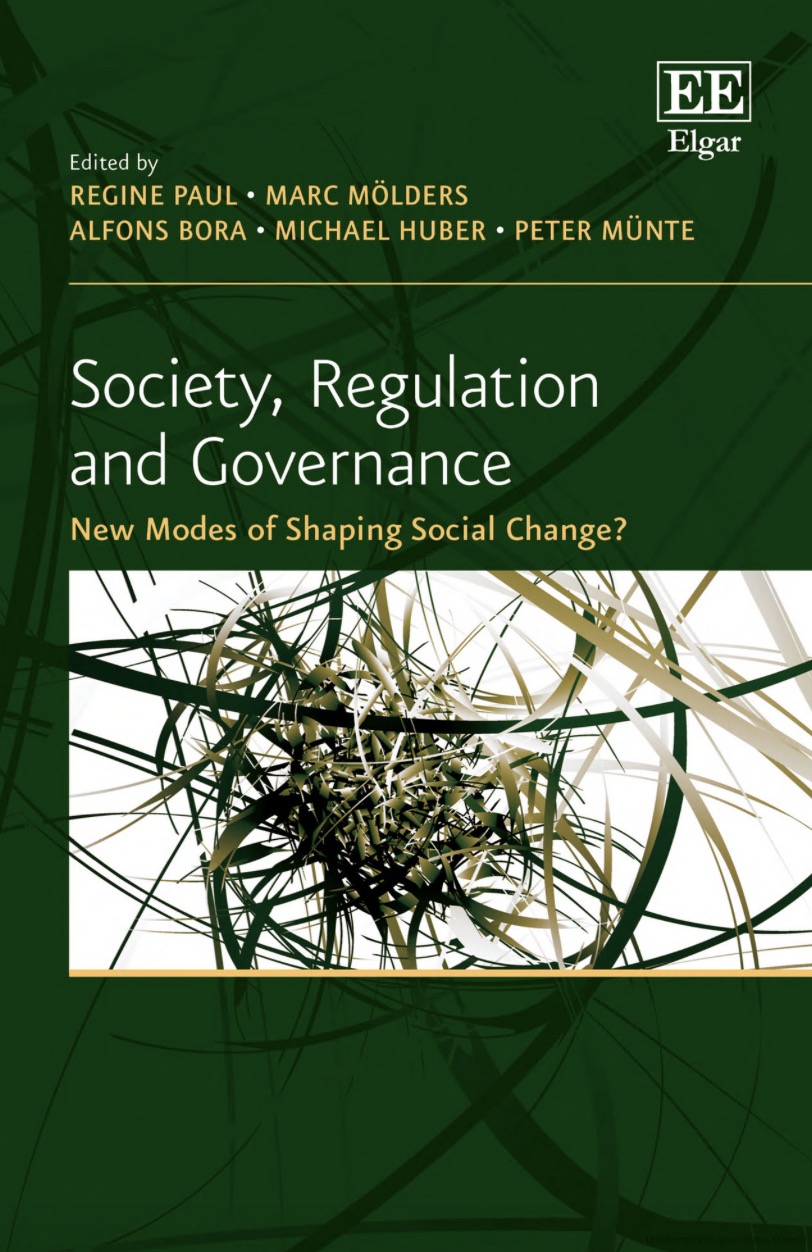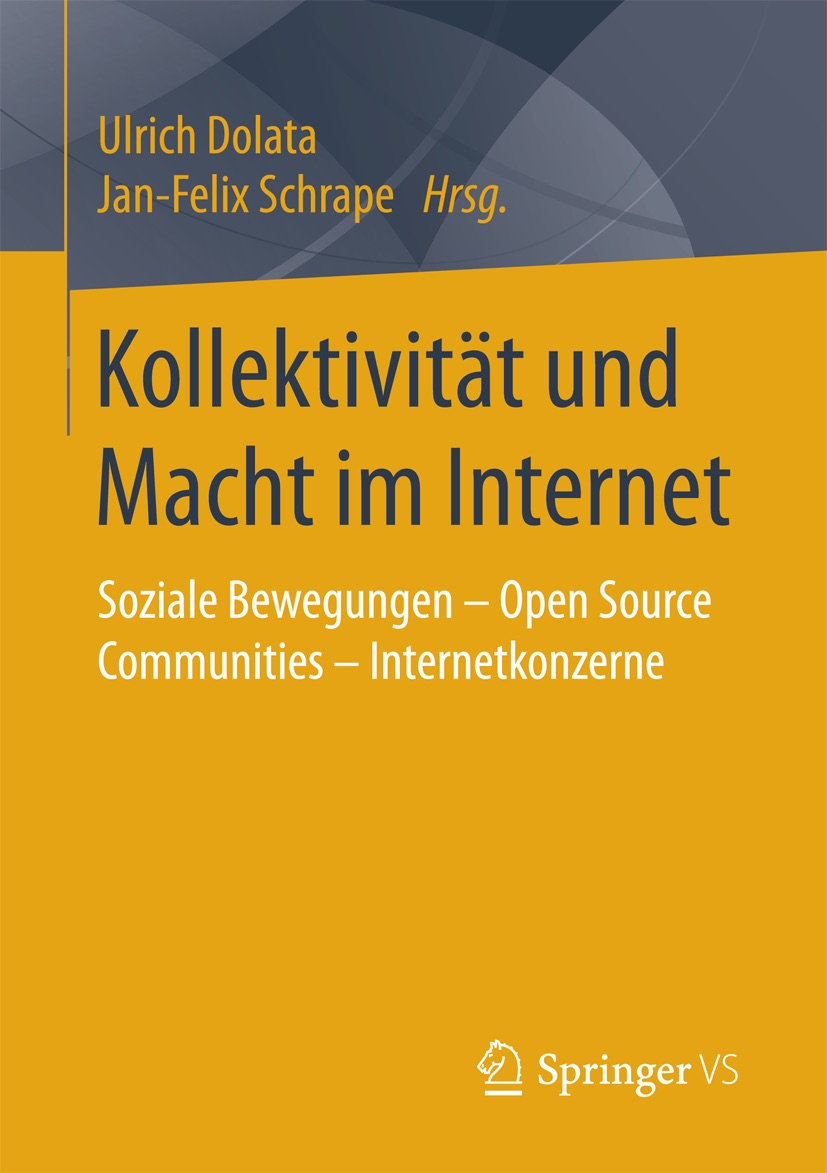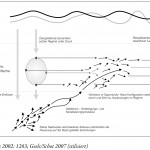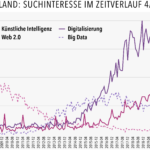1. August 2017
Ende Juli ist der von Bielefelder Kolleginnen und Kollegen herausgegebene Band »Society, Regulation and Governance New Modes of Shaping Social Change?« bei Edward Elgar Publishing erschienen. Darin finden sich Beiträge von A.-L. Beaussier, A. Bora, E. Carmel, M. Huber, D. Kuchenbuch, M. Mölders, P. Münte, R. Paul, H. Rothstein, J.-F. Schrape und L. Viellechner.

This book brings together sociologists, political scientists, legal scholars and historians to produce an interdisciplinary critical evaluation of alleged ›new modes‹ of social change, specifically: risk, publics and participation. It makes three key contributions by:
- offering a consolidation and re-appraisal of a debate that has become increasingly vague with its academic and political proliferation
- identifying a uniting conceptual-analytical core between regulation and governance which explains the adaptability and innovation-mindedness of processes of ›shaping society‹
- re-focusing on the ›essence‹ of regulation and governance approaches – intentional modes of social change.
Reinlesen lässt sich in den gelungenen Band auf ElgarOnline; mein Kapitel findet sich in einer frühen Version als Discussion Paper auf EconStor.
19. Juli 2017
Die diesjährige Ausgabe der seit 1959 durchgeführten Allensbacher Markt- und Werbeträgeranalyse (AWA) zu den Konsum- und Mediengewohnheiten der deutschen Bevölkerung (23.356 Befragte insgesamt; Herbst 2016 / Frühjahr 2017; Grundgesamtheit: deutschspr. Bevölkerung ab 14 J.) ist erschienen. Einige Ergebnisse:
(Mobile) Internetnutzung
- 90 Prozent der 16- bis 69-Jährigen nutzten das Internet (2010: 77 Prozent); damit folgt die Verbreitung des Internets im Groben in seiner Geschwindigkeit der Verbreitung des Fernsehens in der BRD ab 1956.
- Das tägliche Zeitbudget für die Mediennutzung insgesamt ist für die Bevölkerung ab 14 Jahren im Schnitt leicht rückläufig (2005: 10 h, 2017: 9:26 h).
- Anfang 2017 hatten 68 Prozent der Befragten und 94 Prozent der unter-30-jährigen Befragten ein Smartphone zur Verfügung (dafür gaben 14 Prozent der Haushalte an, keinen Festnetzanschluss mehr zu haben).
- 51 Prozent der Befragten gaben an, das Internet »ständig, fast die ganze Zeit, mehrmals täglich« zu nutzen. 36 Prozent fanden es wichtig, immer erreichbar zu sein; 31 Prozent verschicken lieber Textnachrichten als zu telefonieren.
- Zum Nutzerkreis von »sozialen Netzwerken« gehörten 77 Prozent der 14- bis 29-Jährigen, 56 Prozent der 30- bis 44- und 31 Prozent der 45- bis 59-Jährigen.
6. Juli 2017
Aus: Dolata, Ulrich / Schrape, Jan-Felix (2018): Kollektivität und Macht im Internet. Wiesbaden: Springer VS (S. 24–30).
Vieles, was Bewegungen und Gemeinschaften auszeichnet, hat sich mittlerweile [in den Online-Bereich] verschoben: kollektive Meinungsbildung und Abstimmung, politische Kampagnen und Mobilisierung, Organisierung und Koordination der Aktivitäten, fachlicher Austausch und gemeinschaftliche Produktion.
Die genannten sozialen Merkmale der Institutionalisierung kollektiver Akteure werden dadurch zwar nicht außer Kraft gesetzt. Sie werden allerdings substanziell erweitert um neue Organisierungs- und Strukturierungsleistungen von Kommunikation, Produktion und Protest, die das Internet und seine Plattformen als technologische Infrastrukturen bieten.
Dementsprechend lässt sich die Institutionalisierung des Kollektiven heute nicht mehr als rein sozialer, sondern nur noch als soziotechnischer Prozess auf angemessene Weise abbilden: als systematische Verschränkung von sozialen und technischen Organisierungs- und Strukturierungsleistungen, deren Zusammenspiel allerdings von Fall zu Fall erheblich variiert […].
Weiterlesen »
28. Juni 2017
In der italienischen Wochenzeitschrift L’Espresso ist heute der Beitrag »L’utopia di internet oggi è morta. E anche i guru della rete si sono pentiti« von Fabio Chiusi erschienen. Der Text beschäftigt sich mit dem Aufstieg bzw. vor allen Dingen dem Fall der Internet-Utopien und greift in diesem Zusammenhang auch auf den Artikel »The Logic of Digital Utopianism« von Sascha Dickel und mir zurück.
Eine äußerst rudimentäre (stellenweise unbrauchbare) Google-Übersetzung von Chiusis Beitrag findet sich hier.
23. Juni 2017
Der Reuters Institute Digital News Report 2017 ist erschienen und bietet wie in den Jahren zuvor einen Überblick zur weltweiten Rezeption von Nachrichtenangeboten und Nutzung der unterschiedlichen Medienkanäle in der individuellen Versorgung mit tagesaktuellen Informationen: Hier die wichtigsten Links dazu:
Kernergebnisse: Das Vertrauen in journalistische Nachrichtenangebote ist mit 40 Prozent über alle Länder hinweg weiterhin niedrig; in der BRD liegt dieser Wert bei 50 Prozent. Hierzulande und in vielen anderen europäischen Ländern ist die Social-Media-Nutzung in der News-Rezeption rückläufig (nicht aber in den USA). Die aktive Partizipation im Web verharrt im Nachrichtenbereich auf geringem Niveau. Sascha Hölig (Hans-Bredow-Institut für Medienforschung) begründet das wie folgt:
»Es ist nur ein ganz kleiner Teil der Bevölkerung, der Nachrichten teilt und kommentiert, nur zehn Prozent der Nutzer von sozialen Medien. Es ist ein verbreitetes Zerrbild, dass die Menschen alles diskutieren und teilen möchten. Das Interesse daran besteht gar nicht. Man sollte nicht unterschätzen, wie viele die klassische Lean-Back-Situation vor dem Fernseher vorziehen, wenn sie von der Arbeit nach Hause kommen.«
17. Juni 2017
Anfang Juli erscheint das von mir und Ulrich Dolata zusammengestellte Buch »Kollektivität und Macht im Internet: Soziale Bewegungen – Open Source Communities – Internetkonzerne« (Amazon, 19,90 Euro). Das Einführungskapitel lässt sich schon jetzt als Leseprobe bei Springer VS herunterladen.

Das Buch geht den Fragen nach, wie sich die vielfältigen neuartigen Formen von Kollektivität in der Internetgesellschaft voneinander unterscheiden und typisieren lassen und welche Rolle die technischen Infrastrukturen des Netzes für deren Entstehung bzw. Verstetigung spielen. Es wird diskutiert, auf welche Weise sich die Mobilisierung und Organisierung sozialer Bewegungen durch Social Media verändert, wie Arbeits- und Entscheidungsprozesse in Open-Source-Communities strukturiert sind und über welche ökonomische und regelsetzende Macht die großen Internetkonzerne als wesentliche Gatekeeper und Kuratoren der Kommunikation im Netz heute verfügen.
2. Juni 2017
Anfang Juni sind die ersten Teile des State of the News Media Report 2017 erschienen, der seit 2004 durch das Pew Research Center herausgegeben wird und einen Überblick über die sozioökonomischen Entwicklungen im US-amerikanischen Journalismus gibt.
Weiterlesen »
















